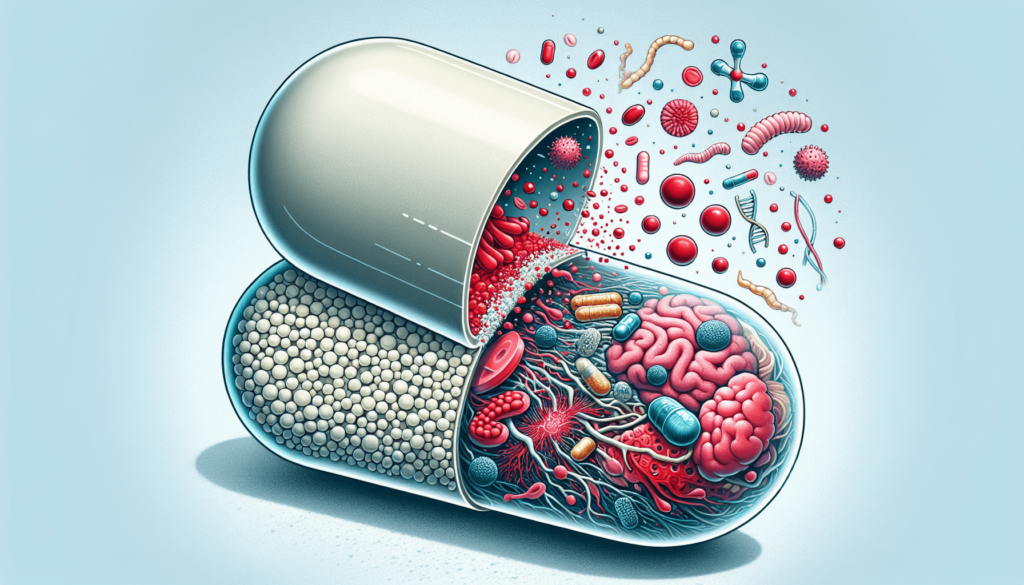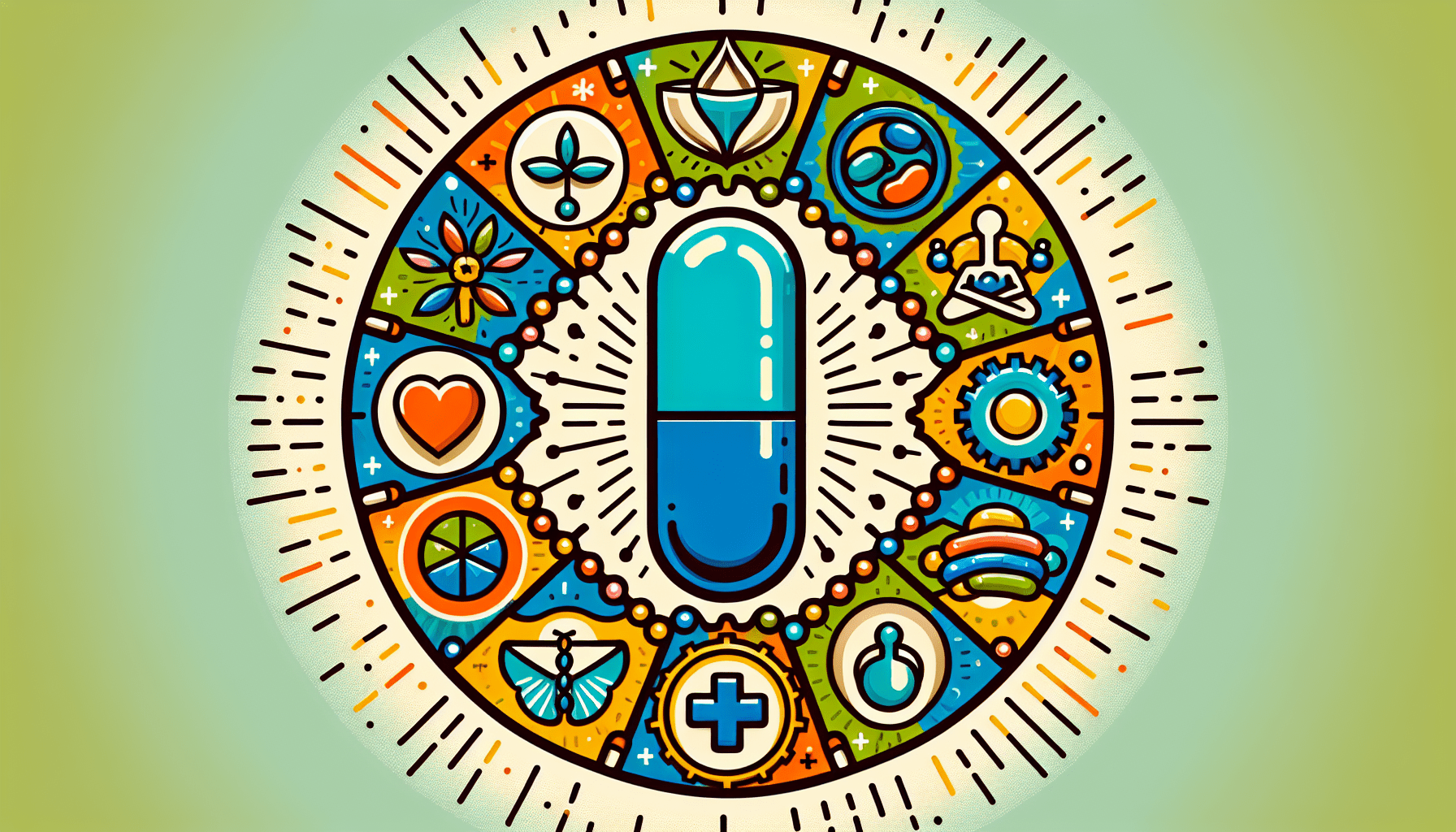Are you looking for a natural and holistic approach to improving your overall well-being? Look no further than probiotics! These tiny, friendly bacteria play a vital role in promoting a healthy gut and bolstering your immune system. In this article, we’ll explore the incredible benefits of probiotics and how they contribute to a balanced and harmonious lifestyle. So sit back, relax, and get ready to discover the magical world of probiotics and their role in holistic health.

Understanding Probiotics
Probiotics Defined
Probiotics are live microorganisms that provide health benefits when consumed in adequate amounts. They are often referred to as “good bacteria” because they help maintain a healthy balance in your body. These microorganisms can be found in various foods, such as yogurt, kefir, sauerkraut, and kimchi, as well as in certain dietary supplements.
Types of Probiotics
There are many different types of probiotics, but the most common ones belong to the Lactobacillus and Bifidobacterium families. Lactobacillus strains are often found in fermented dairy products, while Bifidobacterium strains are commonly found in the digestive system. Each type of probiotic has its own unique benefits and functions, so it’s important to choose the right ones based on your specific health needs.
Mechanisms of Action
Probiotics work in several ways to promote good health. They can help restore the natural balance of bacteria in your gut, which is crucial for proper digestion and nutrient absorption. Additionally, probiotics can strengthen your immune system by increasing the production of antibodies and stimulating the activity of immune cells. They also produce substances that can inhibit the growth of harmful bacteria and reduce inflammation in the body.
Benefits of Probiotics
Improves Digestive Health
One of the most well-known benefits of probiotics is their ability to improve digestive health. They can help alleviate symptoms of common gastrointestinal issues, such as bloating, gas, and diarrhea. Probiotics also play a role in maintaining a healthy gut lining, which is essential for proper nutrient absorption. By promoting a balanced gut microbiota, probiotics support optimal digestion and overall gut health.
Boosts Immune Function
A healthy immune system is essential for protecting your body against infections and diseases. Probiotics can enhance immune function by increasing the production of immune cells and regulating their activity. They help create a barrier against harmful pathogens, preventing them from entering the body. By strengthening your immune system, probiotics can lower the risk of common illnesses and promote overall well-being.
Manages Weight and Metabolism
Maintaining a healthy weight is not just about eating a balanced diet and exercising regularly. Probiotics can also play a role in weight management. Certain strains of probiotics have been found to regulate appetite and promote a feeling of fullness, which can prevent overeating. They can also enhance fat burning and improve insulin sensitivity, helping to manage weight and support a healthy metabolism.
Reduces Inflammation
Inflammation is the body’s natural response to injury or infection. However, chronic inflammation can lead to various health problems, including autoimmune diseases and cardiovascular conditions. Probiotics have been shown to have anti-inflammatory properties, as they can reduce the production of inflammatory substances in the body. By reducing inflammation, probiotics contribute to overall well-being and may help prevent chronic diseases.
Enhances Mental Well-being
Did you know that your gut health can affect your mental well-being? The gut-brain axis is a complex communication network between the gut and the brain, and probiotics play a role in this connection. Probiotics can influence the production of neurotransmitters, such as serotonin and dopamine, which are essential for mood regulation. By promoting a healthy gut microbiota, probiotics can have a positive impact on mental well-being, reducing symptoms of anxiety and depression.
Probiotics and Gut Health
The Gut Microbiota
The gut microbiota is a collection of microorganisms, including bacteria, viruses, and fungi, that reside in your digestive system. It is often referred to as the “forgotten organ” because of its crucial functions in overall health. The gut microbiota helps with digestion, nutrient absorption, and the synthesis of certain vitamins. It also plays a role in the immune system and communicates with the brain through the gut-brain axis.
Maintaining a Healthy Gut
Maintaining a healthy gut microbiota is essential for optimal digestive health and overall well-being. Several factors can influence the balance of bacteria in your gut, including diet, stress levels, medications, and lifestyle choices. Consuming probiotics through food or supplements can help restore and maintain a healthy gut microbiota. It’s also important to include prebiotic-rich foods, such as fruits, vegetables, and whole grains, as they provide nourishment for the beneficial bacteria in your gut.
Probiotics and Gut-Brain Axis
The gut-brain axis is a bidirectional communication system between the gut and the brain. It involves a complex network of nerves, hormones, and chemical signals. Probiotics play a role in this connection by influencing the production and signaling of neurotransmitters. By positively modulating the gut microbiota, probiotics can have a beneficial impact on the gut-brain axis, promoting better mental well-being and cognitive function.
Probiotics and Skin Health
The Skin Microbiome
Just like the gut microbiota, the skin is home to a diverse community of microorganisms known as the skin microbiome. These microorganisms, including bacteria and fungi, play a crucial role in maintaining healthy skin. The skin microbiome helps protect against harmful pathogens, regulates skin pH, and contributes to the overall balance and integrity of the skin barrier.
Promoting Healthy Skin
Probiotics can promote healthy skin by restoring and maintaining a balanced skin microbiome. Certain strains of probiotics have been found to inhibit the growth of harmful bacteria on the skin, preventing acne and other skin conditions. Probiotics can also strengthen the skin barrier, reducing moisture loss and improving skin hydration. By supporting a healthy skin microbiome, probiotics contribute to overall skin health and radiance.
Treating Skin Conditions
In addition to promoting healthy skin, probiotics can also be used to treat certain skin conditions. For example, probiotics have shown promising results in managing acne, eczema, and rosacea. They can help reduce inflammation, regulate sebum production, and improve the skin’s natural defense mechanisms. While more research is needed, incorporating probiotics into skincare routines is an emerging trend for improving skin conditions and maintaining a healthy complexion.

Probiotics and Women’s Health
Maintaining Vaginal Health
The vaginal microbiota is a unique ecosystem that plays a crucial role in maintaining vaginal health. A balanced vaginal microbiota is dominated by beneficial lactobacilli bacteria, which help prevent the overgrowth of harmful bacteria and yeast. Probiotics can help maintain a healthy vaginal microbiota by restoring the natural balance of bacteria. They can reduce the risk of common vaginal infections, such as bacterial vaginosis and yeast infections.
Preventing Urinary Tract Infections
Urinary tract infections (UTIs) are a common concern for many women. Probiotics, particularly lactobacillus strains, can help prevent UTIs by inhibiting the growth of bacteria in the urinary tract. These probiotics produce substances that create an unfavorable environment for harmful bacteria, reducing the risk of infection. By incorporating probiotics into their routine, women can support their urinary tract health and reduce the frequency of UTIs.
Supporting Fertility and Pregnancy
Probiotics can also play a role in supporting women’s reproductive health. They can help maintain a healthy vaginal microbiota, which is important for fertility and conception. Additionally, probiotics have been found to reduce the risk of certain complications during pregnancy, such as gestational diabetes and pre-eclampsia. By promoting a healthy balance of bacteria, probiotics can support women’s reproductive health and contribute to a healthy pregnancy.
Probiotics and Mental Well-being
The Gut-Brain Connection
The gut-brain connection is a bidirectional communication system between the gut and the brain. It involves a complex network of nerves, hormones, and chemical signals. Probiotics play a role in this connection by influencing the production and signaling of neurotransmitters. By positively modulating the gut microbiota, probiotics can have a beneficial impact on the gut-brain axis, promoting better mental well-being and cognitive function.
Reducing Anxiety and Depression
Anxiety and depression are common mental health disorders that can greatly impact a person’s quality of life. Research suggests that the gut microbiota plays a role in the development and regulation of these conditions. Probiotics have shown promising results in reducing symptoms of anxiety and depression by modulating the gut microbiota and influencing neurotransmitter production. While they are not a substitute for professional treatment, incorporating probiotics into a holistic wellness routine may support overall mental well-being.
Improving Cognitive Function
Cognitive function encompasses various mental processes, including memory, attention, and problem-solving. The gut-brain axis has been found to play a crucial role in cognitive function, and probiotics are believed to have a positive impact on this connection. Probiotics can enhance the production of neurotransmitters, such as serotonin and dopamine, which are important for cognitive processes. By promoting a healthy gut microbiota, probiotics may contribute to improved cognitive function and brain health.
Probiotics and Immune Function
Strengthening the Immune System
A strong immune system is vital for defending your body against infections and diseases. Probiotics can strengthen the immune system by increasing the production of antibodies and stimulating the activity of immune cells. They also help create a barrier against harmful pathogens, preventing them from entering the body. By supporting a healthy immune system, probiotics can enhance your body’s ability to fight off infections and maintain overall health.
Preventing and Treating Infections
Probiotics have been shown to prevent and treat various types of infections. For example, certain strains of probiotics have been found to reduce the risk of respiratory tract infections, such as the common cold. They can also help prevent and treat gastrointestinal infections, such as diarrhea caused by rotavirus or Clostridium difficile. By inhibiting the growth of harmful bacteria and supporting a healthy microbiota, probiotics can be a valuable tool in preventing and managing infections.
Alleviating Allergies
Allergies are immune system reactions to substances that are typically harmless. Probiotics can help alleviate allergies by modulating immune responses and reducing inflammation. They can enhance the production of regulatory cells that suppress allergic reactions and balance the immune system. While more research is needed, incorporating probiotics into a holistic wellness routine may help reduce the severity and frequency of allergic symptoms.
Probiotics and Weight Management
Regulating Appetite and Satiety
Probiotics can play a role in regulating appetite and satiety, which are important factors in weight management. Certain strains of probiotics have been found to produce substances that can suppress appetite and promote a feeling of fullness. By modulating the gut microbiota, probiotics can influence the production of hormones involved in appetite regulation, such as ghrelin and leptin. This may help prevent overeating and support healthy weight management.
Enhancing Fat Burning
Maintaining a healthy weight involves not just reducing calorie intake but also enhancing fat burning. Probiotics have been found to influence energy metabolism and enhance fat oxidation. They can increase the activity of certain enzymes involved in fat metabolism, promoting the breakdown and utilization of stored fat. By incorporating probiotics into a healthy lifestyle, individuals may support their weight management goals and improve body composition.
Balancing Gut Microbes for Weight Control
The balance of bacteria in your gut microbiota plays a role in weight control. Probiotics can help restore and maintain a balanced gut microbiota, which is associated with a healthier weight. Certain strains of probiotics have been found to reduce the amount of energy extracted from food and increase the excretion of fat. By supporting the growth of beneficial bacteria and inhibiting the growth of harmful bacteria, probiotics may contribute to weight control and metabolic health.
Choosing the Right Probiotic
Identifying Probiotic Strains
When choosing a probiotic, it’s important to consider the specific strains of bacteria that are included. Different strains have different functions and benefits, so it’s important to choose ones that align with your health goals. Look for strains that have been scientifically studied and proven effective for the intended purpose, whether it’s improving digestive health, boosting the immune system, or promoting skin health.
Formulations and Dosages
Probiotics are available in various formulations, including capsules, powders, liquids, and even certain food products. Consider your preferences and lifestyle when choosing a formulation. It’s also important to follow the recommended dosage instructions for each specific product. Dosages can vary depending on the strain and intended use, so it’s important to read and follow the instructions provided by the manufacturer.
Quality and Safety Considerations
When choosing a probiotic product, it’s important to prioritize quality and safety. Look for products that have been tested for potency and purity. Ideally, choose products that have been manufactured by reputable companies and have undergone third-party testing. It’s also important to consider any potential allergies or sensitivities you may have when selecting a probiotic product. If you have any underlying health conditions or are taking medications, it’s always best to consult with a healthcare professional before starting any new supplement.
Incorporating Probiotics into Holistic Health
Dietary Sources of Probiotics
One way to incorporate probiotics into your holistic health routine is by including more probiotic-rich foods in your diet. Yogurt, kefir, sauerkraut, kimchi, and other fermented foods are excellent sources of probiotics. Be sure to choose products that contain live and active cultures. Including these foods in your diet can provide a natural and delicious way to increase your probiotic intake and support your overall health.
Supplements and Probiotic Products
If you find it challenging to consume enough probiotics through diet alone, supplements can be a convenient option. Probiotic supplements are available in various forms and strengths. Consider consulting with a healthcare professional to determine the right supplement for your specific needs. Supplements can be a useful addition to your holistic health routine, helping to ensure an adequate intake of beneficial bacteria.
Combining Probiotics with Other Holistic Practices
Probiotics can be combined with other holistic practices to enhance overall health and well-being. Regular physical activity, a balanced diet, stress management techniques, and getting enough sleep are all important components of holistic health. By incorporating probiotics into your wellness routine alongside these practices, you can support a healthy body and mind.
In conclusion, probiotics play a significant role in holistic health. From improving digestive health and boosting immune function to promoting healthy skin and supporting mental well-being, the benefits of probiotics are vast. By understanding the mechanisms of action, the specific benefits for various aspects of health, and how to choose the right probiotic products, you can incorporate this valuable tool into your holistic health routine. Remember to prioritize quality and safety, and consider consulting with a healthcare professional for personalized guidance. With probiotics as part of your holistic health journey, you can work towards a healthier and more balanced body and mind.

